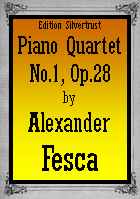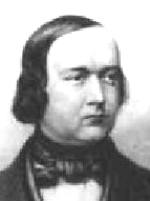Presents
Alexander Fesca
 |
 |
From the Septet |
Piano Quartet No.2 in a minor, Op.286
Fesca's Piano Quartet No.2 in a minor, Op.28 is a version of his Septet No.2 for Violin, Viola, Cello, Bass, Oboe, Horn and Piano which was published in 1842. It is not clear if Fesca made this version at the same time as the Septet. It seems probable that it was done shortly afterwards based on the fact that it was not published until 1844. The rationale for a second version would have most likely been premised on the fact that the Septet was not likely to be played very often, it being for an unusual ensemble, while piano quartets on the other hand, were quite popular at that time. The opening movement, Allegro con spirito, begins with a march-like introduction presented in unison. After developing the material further, a second more lyrical subject is introduced.. Toward the end is an unusual recitativ for the cello. The fetching main theme to the slow movement, Andante con moto, is entirely introduced by the cello in a lengthy solo over soft accompaniment. Eventually the others join in this dreamy, peaceful and pastoral idyll. The violoncello figures so prominently in this movement that one wonders if the commissioner was a cellist. Rather than a scherzo, as one might expect, Fesca inserts a minuet. This Tempo di Menuetto, is intentionally archaic, harking back not to Mozart, Haydn or the classical era but beyond to the time of Gossec with its formal, baroque style. Yet Fesca inserts several very imaginative ideas into this old form, including brief Rossini-esque episode in the trio section. In the finale, Allegro moderato, the piano brings forth the lilting main theme, full of chromatic digressions. When the others join to create a powerful impression the character of the music becomes much more dramatic before Fesca retraces his steps.
Alexander Ernst Fesca (1820-1849) was born in the German city of Karlsruhe where his father Friedrich Ernst Fesca, also a composer, was serving as music director of the Ducal Court Orchestra of Baden. Fesca received his first lessons from his father and was considered a prodigy on the piano. He attended the Prussian Royal Conservatory in Berlin where he graduated with a degree in composition at the young age of 14 after which he enjoyed a career as a pianist and music director. Though he did not live very long, he composed a considerable amount of music. His chamber music includes six piano trios, two piano quartets and two septets for piano, winds and strings.
We have reprinted a very clean copy from the mid 19th century. Please be advised that the piano part is simply the piano part and not a piano score, but there are rehearsal letters. This is a fine work deserving of both concert performance and a place on the stands of amateurs.
Parts: $32.95